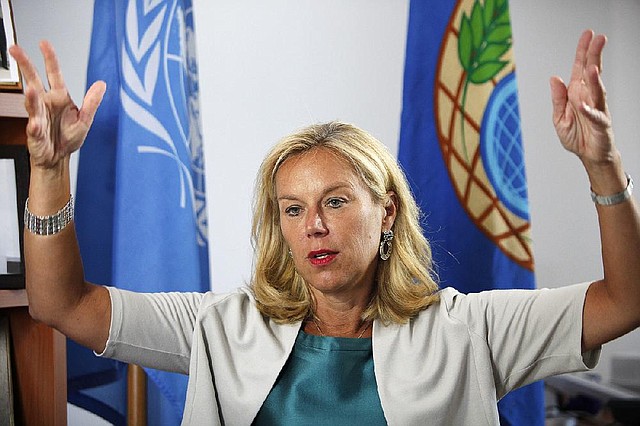Syria turns over last of declared chemical weapons
Sigrid Kaag, special coordinator of the Organisation for the Prohibition of Chemical Weapons (OPCW) for the UN speaks during an interview with Associated Press at a UN compound in the UN buffer zone in capital Nicosia, Cyprus, Monday 23, 2014. Kaag said that “100 percent” of Syria’s chemical weapons material has been removed or destroyed inside the war-torn country, hailing the development that beat a June 30th deadline as a significant milestone for the people of Syria and the region. (AP Photo/Petros Karadjias)
Tuesday, June 24, 2014
NICOSIA, Cyprus -- Syria on Monday finished handing over to Western powers the 1,300 tons of chemical weapons it acknowledged possessing, completing a deal reached last fall under threat of U.S. airstrikes.
The most dangerous material will be transferred to an American ship, which will move into international waters and use specialized equipment to destroy the chemicals over the next two months. Other material will be disposed of at toxic-waste sites in various countries.
Questions persist over whether Syrian President Bashar Assad is hiding undeclared poison gases or attacking rebels with chlorine -- a toxic industrial gas that is not specifically classified as a chemical weapon.
But politicians and activists hailed Monday's milestone as a victory for international diplomacy, and, at the least, a clear reduction in the amount of chemicals available for use in Syria's civil war.
The news came during high tensions across the Middle East as Israel carried out retaliatory strikes on Syria, and a Syrian Cabinet member warned that Sunni insurgents in Iraq have been funneling weapons to rebels in Syria.
The material handed over by Syria included mustard gas and precursors to the nerve gas sarin.
Syria agreed to surrender its arsenal when the U.S. threatened missile strikes in retaliation for a chemical attack on a rebel-held suburb of Damascus. The attack is believed to have killed more than 1,000 people.
The deal was put together by the United States and Russia, which has been Assad's most powerful international backer during the war.
The Organization for the Prohibition of Chemical Weapons, the watchdog agency overseeing Syria's disarmament, confirmed that the final 100 tons of chemicals had been loaded onto a Danish ship in the Syrian port of Latakia.
The completion of the task came nearly two months past the April 27 deadline set by the United Nations. The Organization for the Prohibition of Chemical Weapons said that was because of security concerns during the fighting.
Ahmet Uzumcu, director general of the organization, acknowledged that Syria still could be hiding some of its arsenal.
"I can't say ... that Syria doesn't have any chemical weapons anymore," Uzumcu said.
But he said that is true of any country, and he added that Syria's declared arsenal was close to estimates made by outside experts.
He described the Syrian government's overall cooperation as "satisfactory."
Sigrid Kaag, head of the Organization for the Prohibition of Chemical Weapons, said her team's experts "are working closely with the Syrian Republic to look at any discrepancies or any revisions" in Syria's declaration that need to be made.
A fact-finding mission last month found evidence that chlorine gas was used in fighting between rebels and Assad's government. The organization stopped short of saying which side was to blame.
The use of any toxic material as a weapon is illegal under international law.
The Syrian Foreign Ministry said in a statement that the removal of the chemicals "is further evidence that Syria adheres to its international commitments."
Andrew Tabler, a senior fellow at the Washington Institute for Near East Policy, agreed that the reduction in arms is a net positive but said now it will become more evident that the U.S. has few good options for helping resolve Syria's conflict.
"The war in Syria was never about chemical weapons. That was just one chapter of it, and it's not completely closed," he said.
Information for this article was contributed by Zeina Karam, Bassem Mroue, Albert Aji, Lolita Baldor, Edith Lederer and Lara Jakes of The Associated Press.
A Section on 06/24/2014
